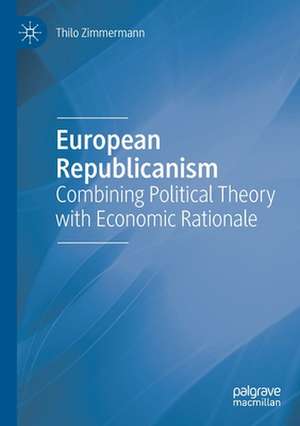European Republicanism: Combining Political Theory with Economic Rationale
Autor Thilo Zimmermannen Limba Engleză Paperback – 22 noi 2020
In this topical and interdisciplinary book, the author combines many important strings of European integration theory, history, economics and political sciences, which are clearly brought together into a coherent analytical discourse. Its strength is the interdisciplinary interaction between politics and economics, as well as theoretical and practical issues which are of high relevance for public debate in Europe.
This book will be of interest to scholars and students interested in economic integration, as well as history and political philosophy.
| Toate formatele și edițiile | Preț | Express |
|---|---|---|
| Paperback (1) | 470.88 lei 6-8 săpt. | |
| Springer International Publishing – 22 noi 2020 | 470.88 lei 6-8 săpt. | |
| Hardback (1) | 645.60 lei 6-8 săpt. | |
| Springer International Publishing – 22 noi 2019 | 645.60 lei 6-8 săpt. |
Preț: 470.88 lei
Preț vechi: 553.98 lei
-15% Nou
Puncte Express: 706
Preț estimativ în valută:
90.10€ • 94.31$ • 74.99£
90.10€ • 94.31$ • 74.99£
Carte tipărită la comandă
Livrare economică 31 martie-14 aprilie
Preluare comenzi: 021 569.72.76
Specificații
ISBN-13: 9783030259372
ISBN-10: 3030259374
Pagini: 325
Ilustrații: XVII, 325 p. 8 illus.
Dimensiuni: 148 x 210 mm
Greutate: 0.41 kg
Ediția:1st ed. 2019
Editura: Springer International Publishing
Colecția Palgrave Macmillan
Locul publicării:Cham, Switzerland
ISBN-10: 3030259374
Pagini: 325
Ilustrații: XVII, 325 p. 8 illus.
Dimensiuni: 148 x 210 mm
Greutate: 0.41 kg
Ediția:1st ed. 2019
Editura: Springer International Publishing
Colecția Palgrave Macmillan
Locul publicării:Cham, Switzerland
Cuprins
1. Introduction.- Part I: Shortcomings of Current Theories of EI.- 2. Federalism, Sovereignty and Modernity.- 3. The Obsolescence of Neo-Functionalism.- 4. Liberalism: Do Economics Drive EI?.- 5: How to Solve the Problems of EI-Theory?.- Part II: European Republicanism.- 6. Approaches to a European Republic.- 7. A Political Philosophy of Public Goods.- Part III: Overcoming the Problems of EI-Theory.- 8: Sovereignty and Monetary Integration.- 9. Externalities caused by a Common Factor Market.- 10. What drives European Integration?.- 11. Conclusions.
Notă biografică
Thilo Zimmermann studied economics at the University of Cologne and Genoa. Before his PhD at the Scuola Superiore Sant’Anna in Pisa, he was working at the economic department of the German Embassy in Rome. During his PhD, he spent research periods at the Weatherhead Center for International Affairs at Harvard University and the Écoles Normales Supérieures (Rue d’Ulm and Cachan) in Paris.
Caracteristici
Provides a critical overview of current theories of European integration Offers a new and refreshing approach to explain European integration Compares existing theories of European integration with the new approach of European Republicanism, to demonstrate how European integration theories could be developed further
